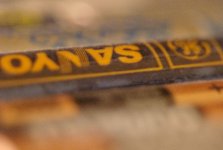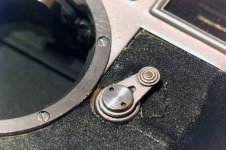kloudags
Member
Hello,
I have been looking for info on the forum about that subject, especially on wide-angle and DOF posts, but nonetheless i have not found the answer...
Ok, Rangefinder cameras and optics are far from being the best tool for macro photography, but my question is still valuable (i hope).
What would be the most appropriate lens to do some macro shooting on a RD1 camera? Are there any combination possible (eg with an extender?).?
Any custom-made systems ideas too?
Thanks for your input.
S.
I have been looking for info on the forum about that subject, especially on wide-angle and DOF posts, but nonetheless i have not found the answer...
Ok, Rangefinder cameras and optics are far from being the best tool for macro photography, but my question is still valuable (i hope).
What would be the most appropriate lens to do some macro shooting on a RD1 camera? Are there any combination possible (eg with an extender?).?
Any custom-made systems ideas too?
Thanks for your input.
S.
R
RML
Guest
I recently found an extension tube for my dad's Praktica. I screwed in a 50/1.2 lens, added a ltm adapter, stuck that on a M-mount adapter, et voila... macro. Not useful,t hough, as I can't focus it at all unless I find out empirically what's the right focusing distance.
nemjo
Avatar Challenge
Visoflex???
kloudags
Member
OK, thanks for your input.
The Visoflex system seems quite appropriate indeed, regardless of the fact that you have to use Leica lenses. I wonder if you can use some CV lense too?
The thing is I was also wondering what is currently the best existing lens for macro close-up that can be used on RD1 in other words, with shortest DOF).
Thanks.
S.
The Visoflex system seems quite appropriate indeed, regardless of the fact that you have to use Leica lenses. I wonder if you can use some CV lense too?
The thing is I was also wondering what is currently the best existing lens for macro close-up that can be used on RD1 in other words, with shortest DOF).
Thanks.
S.
manojd
Established
It can be done, but it's not easy...
It can be done, but it's not easy...
I tried doing this with a Visoflex system. It will work, but getting all the right parts for Viso is not easy. In fact I had to return my Viso because the adapter was wrong. Here are some options:
If you want really close macro, you can get an M mount Visoflex 1 and mount the 90 elmar head directly on the viso housing. This gives you focus as close as 2-3 inches. See the attached pics.
Another option is to get an extension tube for 90/4 elmar or 135 hektor. This is almost impossible to focus unless you have a studio setup or do lots of trial and error.
Good luck!
It can be done, but it's not easy...
I tried doing this with a Visoflex system. It will work, but getting all the right parts for Viso is not easy. In fact I had to return my Viso because the adapter was wrong. Here are some options:
If you want really close macro, you can get an M mount Visoflex 1 and mount the 90 elmar head directly on the viso housing. This gives you focus as close as 2-3 inches. See the attached pics.
Another option is to get an extension tube for 90/4 elmar or 135 hektor. This is almost impossible to focus unless you have a studio setup or do lots of trial and error.
Good luck!
Attachments
jlw
Rangefinder camera pedant
I haven't actually tried this myself (although maybe it should; sounds like fun!) but suspect another option might be to find a third-party screwmount reflex housing, such as the Accura, plus a screwmount bellows.
You used to see this kind of outfit gathering dust on the back shelves of old camera stores all across the country, but I'll bet a lot of them simply were thrown out eventually because they were considered obsolete and useless. Now, with the R-D 1 bringing a lot of old screwmount stuff back to life, it might be worth trying to find one.
The screwmount bellows would mean you could use an inexpensive enlarging lens, and these lenses usually have excellent performance in the close-up range (since that's where they were designed to work.) If you could find, make or have made an appropriate adapter (a machinist with a lathe could cut threads for it) you also could try using C-mount 16mm cine camera lenses; these would cover the R-D 1's sensor at close ranges, and would make really huge magnifications possible.
Using the R-D 1 instead of a DSLR for this kind of thing actually isn't a stupid idea at all. The instant-return mirror in a DSLR is actually kind of a drawback -- you have to use mirror lockup to suppress the vibration that would otherwise mar your results at huge magnifications -- so a reflex housing plus the mirrorless R-D 1 body would be a plus rather than a minus. And you could fold out the R-D 1's LCD for comfortable viewing with the camera on a copy stand, making it easy to check your results. (Epson says not to use the LCD except when it's folded flush with the camera body, but I've done it and don't see any harm in it as long as you're careful not to whang into it...)
You used to see this kind of outfit gathering dust on the back shelves of old camera stores all across the country, but I'll bet a lot of them simply were thrown out eventually because they were considered obsolete and useless. Now, with the R-D 1 bringing a lot of old screwmount stuff back to life, it might be worth trying to find one.
The screwmount bellows would mean you could use an inexpensive enlarging lens, and these lenses usually have excellent performance in the close-up range (since that's where they were designed to work.) If you could find, make or have made an appropriate adapter (a machinist with a lathe could cut threads for it) you also could try using C-mount 16mm cine camera lenses; these would cover the R-D 1's sensor at close ranges, and would make really huge magnifications possible.
Using the R-D 1 instead of a DSLR for this kind of thing actually isn't a stupid idea at all. The instant-return mirror in a DSLR is actually kind of a drawback -- you have to use mirror lockup to suppress the vibration that would otherwise mar your results at huge magnifications -- so a reflex housing plus the mirrorless R-D 1 body would be a plus rather than a minus. And you could fold out the R-D 1's LCD for comfortable viewing with the camera on a copy stand, making it easy to check your results. (Epson says not to use the LCD except when it's folded flush with the camera body, but I've done it and don't see any harm in it as long as you're careful not to whang into it...)
Ed Schwartzreic
Well-known
I use an R-D1 all the time for macro shots on a Reprovit IIa, and have used it with a Viso II and chimney finder (neither RA finder fits). There is no problem at all, except that one should make a mask to cover the field cut, so one can see what is actually going to be on the sensor.
Ed
Ed
vha
Isn't it coffee time ?
Have just tested it a few times with a Viso II w/90mm elmarit, and it works fine, might be i have to un-dust the bellows and the reflex housing, but that is a different topic. . . And as said the framing is not accurate, but the screen tells fine enough for me ..
But it is really fun to play with
vha
But it is really fun to play with
vha
Attachments
kloudags
Member
Visoflex II
Visoflex II
Thank you for your input, it is very usefull!
I found a Visoflex II to mount on the Rd1, and now, i juste need to find myself a nice Elmarit 90...
Are there any additionnal accessories required/advisable?
Is it possible in any way to mount a Voigtlander lens (in M mount), on that device, and try and obtain some good results? I don't mind trying out anyway, for the fun of it
S.
Visoflex II
Thank you for your input, it is very usefull!
I found a Visoflex II to mount on the Rd1, and now, i juste need to find myself a nice Elmarit 90...
Are there any additionnal accessories required/advisable?
Is it possible in any way to mount a Voigtlander lens (in M mount), on that device, and try and obtain some good results? I don't mind trying out anyway, for the fun of it
S.
manojd
Established
With any Viso system, you need the adapter that goes with the combination of the Viso (I, II or III) and the lens head. good luck finding the right adapter. The Viso cannot take any lens directly on it, unless you mount a screw mount lens. But if you directly mount the lens on the Viso, then you are effectively changing the focal length of the lens.
Share:
-
This site uses cookies to help personalise content, tailor your experience and to keep you logged in if you register.
By continuing to use this site, you are consenting to our use of cookies.




